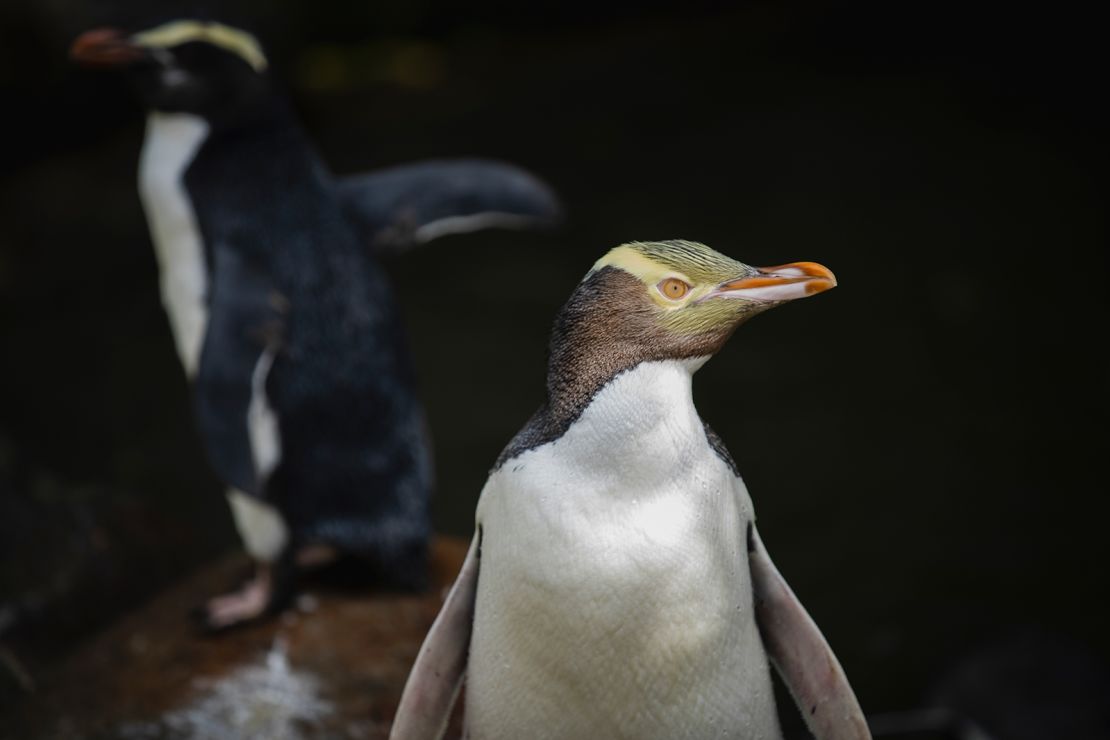Wellington, New Zealand (AP) – It’s noisy, smelly, shy – and it’s New Zealand’s bird of the year.
The hoiho, or yellow-eyed penguin, won the country’s hotly contested bird election on Monday, offering supporters of the endangered bird hope that recognition of its victory could spark a revival for the species.
This was followed by a campaign for the annual Bird of the Year vote, which lacked the foreign interference scandals and cheating controversies of past polls. Instead, activists in the long-running contest sought votes in the usual ways — launching meme wars, seeking celebrity endorsements and even getting tattoos to prove their loyalty.
More than 50,000 people voted in the poll, 300,000 fewer than last year, when British late-night host John Oliver ran a humorous campaign for the pūteketeke – a “deeply weird bird” that eats and regurgitates its feathers – securing a landslide victory.
The number of votes cast this year represented 10% of the population of New Zealand – a country where nature is never far away and where a love of native birds is instilled in citizens from childhood.
“Birds are our heart and soul,” said Emma Rawson, who advocated for the fourth roo, a small brown owl with a melancholy call. New Zealand’s only native mammals are bats and marine species, focusing attention on its popular – and often rare – birds.
This year’s winner, the hoiho – its name means “shouting noise” in Maori – is a shy bird considered the world’s rarest penguin. In New Zealand’s South and Chatham Islands alone – and the sub-Antarctic islands south of the country – numbers have fallen by a dangerous 78% in the past 15 years.
“This spotlight could not have come at a better time. This iconic penguin is disappearing from mainland Aotearoa before our eyes,” Nicola Toki, chief executive of Forest & Bird, which runs the survey, said in a press release, using the name Maori for New Zealand. Despite intense conservation efforts on land, she says, the birds are drowning in nets and the sea and unable to find enough food.
“The campaign has raised awareness but we really hope it will deliver tangible support,” said Charlie Buchan, campaign manager for hoiho. But while the bird struggles, it has attracted a star in the vote: celebrity endorsements have flown in from English zoologist Jane Goodall, Amazing Race host Phil Keoghan and two former New Zealand prime ministers.
Aspiring bird campaign managers – this year from energy companies to high school students – apply for posts to Forest & Bird. The hoiho bid was led by a collective of wildlife groups, a museum, a brewery and a rugby team in Dunedin, where the bird is located on the New Zealand mainland, making it the highest-performing campaign in the 2024 vote.
“I feel like we were a scrappy underdog,” said Emily Bull, a spokeswoman for the second campaign, for the karure – a small, “gothic” black robin found only on New Zealand’s Chatham Island.
The karure offering was run by the students’ association at Victoria University of Wellington, sparking a wild row on the university campus when the student magazine staged a campaign against the koror, or little blue penguin.
The rivalry sparked a meme war and students in bird costumes. A few people got tattoos. When a magazine campaign secured the support of the city council and the local zoo, Bull despaired of the black robin’s offer.

But the karure, which has made a real comeback since the 1980s, with conservation efforts increasing the number of species from five to 250, came second overall.
This weekend, as Rawson ended her ruru campaign, she too turned her efforts directly to the people, courting votes at a local dog park. The veteran campaign manager, who has managed bids for other birds in previous years, was rewarded with ruru placing fourth in the poll, her best result.
“I’ve never been in a human political campaign before,” said Rawson, who is drawn to the contest because of the funds and awareness it generates. The campaign had a calmer tone this year, she added.
“There was no international interference, although it was actually a lot of fun,” she said, referring to Oliver’s high-profile campaign.
This was not the only controversy the election saw. While anyone in the world can vote, Forest & Bird now requires voters to verify their ballots after the competition has been plagued by foreign interference in the past. In 2018, Australian pranksters cast hundreds of fake sex votes.
The following year, Forest & Bird was forced to clarify that the flood of votes from Russia appeared to be coming from legitimate bird lovers.
While the campaigns are fiercely competitive, executives have described tactics more akin to professional wrestling — in which the fights are scripted — than divisive political contests.
“Sometimes people want to post that they’re like fed up with you and they always message you and say, hey, is it okay if I post this?” Bull said. “It’s a really nice community here. It’s really healthy.”
#Shy #penguin #wins #Zealand #bird #election #memefilled #campaign #CNN